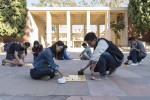Xinru Hua frequently asks her father for help understanding the strategies of Go, a 3,000-year-old traditional Chinese board game.
Hua, a fourth-year applied mathematics student, said her father instilled in her a love for Go when she was 7 years old by enrolling her in a professional Go school and practicing the game with her.
In her second year at UCLA, she found a screenshot of the Go game while scrolling through her WeChat, a social media site popular in China. Hua reached out to a player from WeChat, Mengyi Zhou, a fourth-year statistics and economics student, and they forged a friendship out of shared interest.
[Related: Interactive game allows players to experience a dog’s life]
Zhou and Hua’s friendship led to the inception of the UCLA Go Club. Founded by Zhou in 2014, Go Club holds meetings Fridays for members to play the traditional Chinese game with other Go enthusiasts and celebrate an aspect of Chinese culture, said Yiyun Jin, a second-year mathematics and economics student.
The rules of Go are straightforward – black and white stones are placed at the intersections of a 19-by-19 grid, and each player must work to surround the other player’s stones from all adjacent corners, known as liberties. The player that surrounds more of his or her opponent’s stones and takes control of over half the board is deemed the victor of the match. The game usually ends once one player resigns due to obvious disadvantage.
Go has been a time-honored hobby in China, Hua said. The game attracts thousands of people from countries like Japan and Korea.
[Related: Powell Library plays up video game-centered learning to students]
For Bruin Go players, the challenging manner of the game coupled with a community of people to play with keeps club members coming back every Friday night, Jin said.
One of the most compelling parts of the game is the skill and patience required, Hua said. Players have countless play options, but an accomplished Go player should be able to predict sequences of upcoming steps, Hua said.
The ability to foresee an opponent’s moves requires a special sort of concentration, Zhou said. To reach this level of mental acuity, members must synchronize their minds with that of the competitor, Zhou said.
“When I play Go with another player, I know what he or she is thinking,” Zhou said.
Club members, despite having a packed course load, spend about four hours working through frustrating yet rewarding Go matches during the weekly meetings, Jin said. Many of the players also engage in online matches during the week when their schedules cannot accommodate long, face-to-face games with other players.
But for several club members, the prospect of interacting with people of a shared background is a driving force for involvement. Many members are proud of the game’s element of Chinese culture, Jin said.
The club is made up of predominantly Chinese members, many of whom are international students. This club can often serve as a place for people to connect through a common language and a shared love for this time-honored Chinese tradition, Hua said.
“Playing Go is a way for us to get together and celebrate a beautiful legacy of our culture,” Jin said.
Several players, including Jin, started off as beginners when they entered the club. However, by training with more experienced players and analyzing the reasons behind losses, the beginners grew to be more confident in their abilities, Jin said. Older, more experienced members often talk beginners through difficult steps for several hours at a time, Jin said.
By engaging with new people and grasping various styles of playing, each person can diversify their techniques and mature as a player, Jin said.
Despite differences in techniques or playing level, each member has a mutual appreciation for this culturally meaningful pastime.
“Go is like a panda: black, white and Asian,” Zhou said. “This is America, and I always feel proud to advertise my culture to the outside.”

“The game attracts thousands of people from countries like Japan and Korea.” ??
This should certainly read “millions”.
~350,000 in Thailand: http://www.wbaduk.com/news/news_view.asp?news_no=192
~10,000 in Britain: http://www.britgo.org/press/faq.html
(USA and Germany certainly have at least as many active go players as Britain)